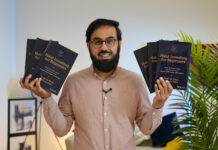After watching the BBC 3 documentary “My Brother, The Terrorist” I recalled my conversation with director Robb Leech, parts of which made it into the documentary, writes Muslim activist Moinul Abu Hamza.
Robb came to see me not long after the Woolwich killings seeking an answer that could connect the mindset of an “Islamist” to a “terrorist.”
At this juncture it’s worth pointing out that Robb made an error in adopting the terms “Islamist” and “terrorist” wholesale from the “War on Terror” narrative, which would mar anyone’s judgement.
The terms “terrorism” and “Islamism” have been blurred by Western governments either to justify foreign occupation, illegal rendition and detainment, or to suppress peaceful political activism which exposes Western governments contravening their own principles.
Our dear brother Moazzam Begg has bared the brunt of these frequent “redrawing of the lines.”
But my point is that Leech, a former tree surgeon turned filmmaker, should know the harmful affects on all plant life if they share diseased soil and polluted air, and his “Islamist plant” was no potted plant.
To further extend the analogy, imagine if Robb Leech was planning a documentary on the government allowing the use of pesticides that disrupted the ecological balance of the countryside. Would he be placing the emphasis on a single evangelical activist from Greenpeace who takes the law into his own hands? Or maybe a documentary on the economic crisis, rising inflation called “My Brother the Banker.”
Subscribe to our newsletter and stay updated on the latest news and updates from around the Muslim world!

My point being that Robb’s rendering of his brothers personal story growing up as his step-brother, looking out for him when he was young, is too simplistic in scope to understand home-grown terror and its relationship with foreign policy.
For example, Robb’s brother Salahuddin (formerly Richard Dart) was at times reclusive, seemingly lost. His father left when he was young, yet he had a strong sense of morality. In fact, many parallels can be drawn with the personality traits of the early Muslims, even Prophet Muhammad (SAW) himself.
Often the disbelieving idolaters accused Prophet Muhammad (SAW) of only having as companions the poor and the weak, at least at the beginning, as a ploy to explain away the attraction that led people to embrace Islam.
This is why standing at the stall in Whitechapel, having grown up knowing many of those who ended up joining Anjum Choudhury, I made it clear to him that most Muslims would find it abhorrent for any non-Muslim or Muslim to be harmed under the rules of the covenant.
Robb seemed interested, in my humble opinion, in finding a link between personal tragedy, unemployment, being an outcast from society, and those who undertake violence in their own country. Almost as though foreign policy is an excuse to throw away one’s life and take up arms.
As for the media portrayal, it’s mentioned that “one brother became an award-winning film director, and the other a Muslim fanatic” – as though becoming a Muslim is a negative thing and could lead to a downward spiral in life while becoming an award-winning film director is synonymous with success.
Personally speaking, I am just an average Muslim who lives in an area constantly under the pressure and the gaze of the media. If I had difficulty relating to my brother I would not feel it necessary to invite the whole world to pass judgement, rather Islam teaches us that siblings should learn from each other and so maybe by the time Richard returns from prison he can learn some humanity/mercy and Robb can find it in himself to separate the misguided actions of his brother and see the beauty of Islam.
And perhaps Robb will only know what makes his brother tick if he becomes Muslim himself.
Despite informing Robb that I did not wish to be in the documentary, the documentary itself was fairer that anything that I have viewed on the BBC as of late. Here’s hoping that the next documentary is “Robb Leech, Your Brother in Islam.”
“My Brother the Terrorist” can be watched on BBC I Player here:
https://www.bbc.co.uk/iplayer/episode/b042m637/My_Brother_the_Terrorist/




















